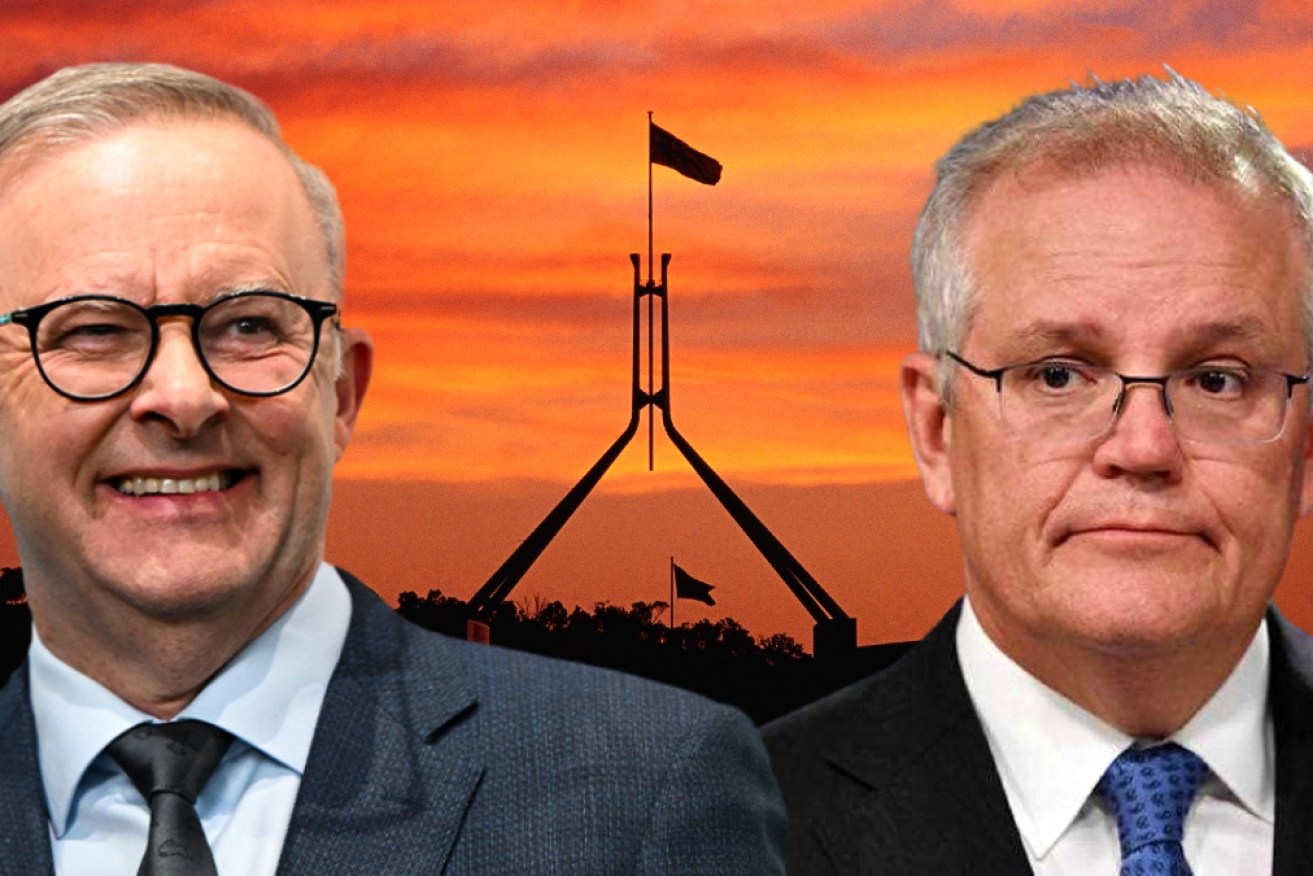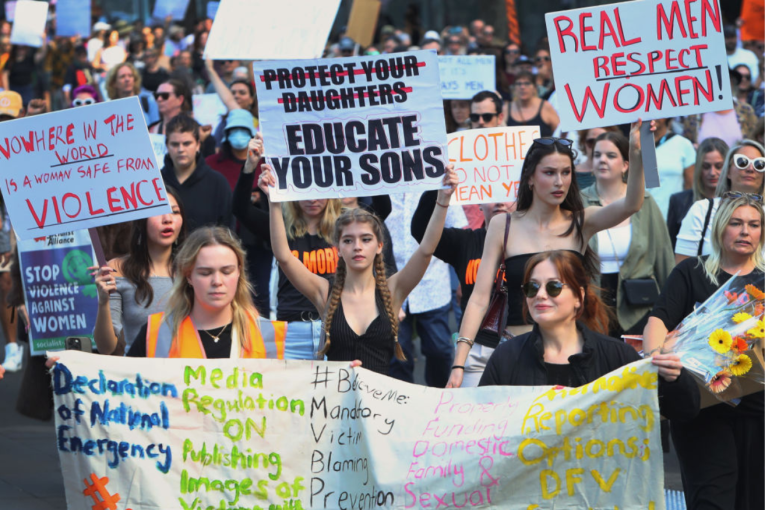Matthew Franklin: Anthony Albanese has the last laugh in a busy 2022


Anthony Albanese is now sitting in the Lodge while vanquished prime minister Scott Morrison ends his year a beaten man. Photo: TND, Getty
Philosopher Jean-Jacques Rousseau once noted: “Patience is bitter, but its fruit is sweet.”
That concept must resonate with Anthony Albanese, whose patience, discipline and cool-headed strategic thinking delivered Labor victory in the May election.
As a result, Albanese is now sitting in the Lodge, chowing down on the fruit of his success.
By contrast, vanquished prime minister Scott Morrison ends his year a beaten man whose time in office has emerged as a case study in the danger of hubris and overreach.
Morrison began 2022 trailing Labor in opinion polls and desperate for clear political air ahead of the approaching election.
He would have felt confident in his campaigning ability based on his strong winning campaign three years earlier. But he needed time to attack Labor and promote what he saw as his political strength of sound economic management.
But there was no clear air.
World events crowded Morrison out of the news cycle. He could not compete with COVID-19, the deportation of tennis player Novak Djokovic before the Australian Open tennis tournament, flooding in New South Wales, tension with China, and Russia’s February 24 invasion of Ukraine.
On the occasions politics did make the front pages, it was negative.

Grace Tame’s now-infamous side eye did not do any favours for Morrison. Photo: AAP
Leaked emails showed then NSW Premier Gladys Berejiklian describing Scott Morrison as a horrible person. Deputy prime minister Barnaby Joyce said he did not trust him. Then a photo of former Australian of the Year Grace Tame giving Mr Morrison a “side eye” made national headlines.
Anthony Albanese could not believe his luck. His opponent, apparently unassailable just 18 months earlier, was on the ropes, a victim of his self-described tendency to behave like a bulldozer.
But luck had nothing to do with Labor’s success.
Personality crisis
Albanese sowed the seeds of victory a year earlier, with a tactical decision to exploit Scott Morrison’s personality as an electoral asset.
Throughout 2020, Morrison, like all political leaders, had built up strong personal support ratings among voters who rallied around leaders because they wanted them to successfully handle the COVID crisis.
Albanese knew he had to bring down Morrison by targeting his character.

The two leaders scoped out plenty of photo opportunities on the campaign trail.
Seizing on Morrison’s failures during the Black Summer bushfires of 2020 and the rollout of COVID vaccines, Albanese portrayed him as a political showman who relied on spin, blamed others for his mistakes, and avoided taking responsibility.
He was the man who didn’t hold a hose; the leader who said rolling out COVID vaccines as “not a race’’.
He did not even accept the existence of the cost-of-living crisis Australians experienced every time they bought petrol or food.
The strategy worked perfectly. By the start of 2022 critics across the board were lining up to criticise Morrison as arrogant, lacking empathy, and contemptuous of proper process.
And as the flow of character assessments continued, Morrison seemed to have no response, just more bluster, spin and lame photo opportunities designed to present him as a kind of Australian everyman.
The truth is that the Coalition was beaten before this year’s formal election campaign even began.
A hard-won victory
But Albanese had to fight extremely hard for his victory within his own Labor Party.
When he assumed the Labor leadership in 2019, Albanese told colleagues they needed a different approach to that of predecessor Bill Shorten, who had contested that year’s election with a huge policy agenda and a front-running leadership style.
The problem was that Morrison successfully presented the big agenda, including changes to tax arrangements on negative gearing, as risky.

Albanese’s election tactic was to focus on key reforms in areas such as child care. Photo: AAP
Albanese’s response was a plan to reduce Labor’s policy offerings to a few key reforms in areas like child care, aged care, climate change and skills training.
He wanted to starve the media-hungry Morrison of any material that he might use to create plausible scare campaigns.
This came to be known as the small target strategy. It would be better described as a slow-burn strategy.
Albanese’s aim was to minimise his political exposure while allowing Morrison to soil his own nest. Then, he wanted to “kick with the wind in the final quarter”.
Such tactics are not new, but they can be controversial. After six years of the front-running Shorten approach, colleagues and the media struggled with the change of strategy.
Factional opponents questioned the tactics. Bedwetting marginal seat holders worried about their seats demanded more policy. Journalists accustomed to a regular feed of news wanted more. True Believers wanted to hear their leader talking about Labor values.

Scott Morrison is ending 2022 fighting for credibility. Photo: AAP
But Albanese held his nerve, telling colleagues a repeat of the 2019 approach would produce another loss.
“My Labor values are about winning elections,” he said.
His decision to make Morrison the issue worked.
Albanese has spent the months since his victory establishing himself on the global leadership stage and delivering election promises.
He’s avoiding Morrison’s focus on political show-boating, presenting himself as a sensible, mature leader. He is not flashy. But he wants to be seen as reliable.
By contrast, Morrison ends the year fighting for credibility.
Post-election revelations that he secretly had himself appointed to multiple ministries have attracted widespread condemnation, including from his former colleagues.
Even worse, his failure to defend Liberal seats against the rise of the so-called Teal independents has left new leader Peter Dutton with a massive task to rebuild.
In 2023, with the long political honeymoon over, Albanese and Dutton will face new challenges.
But 2022 was the year when the virtue of patience delivered the ultimate reward.
Matthew Franklin is a journalist and was a media adviser to Anthony Albanese








